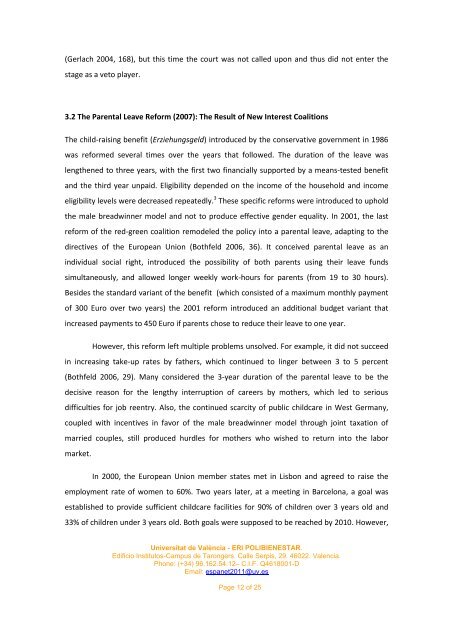Reform Alliances in German Family Policy - 9th Annual ESPAnet ...
Reform Alliances in German Family Policy - 9th Annual ESPAnet ...
Reform Alliances in German Family Policy - 9th Annual ESPAnet ...
You also want an ePaper? Increase the reach of your titles
YUMPU automatically turns print PDFs into web optimized ePapers that Google loves.
(Gerlach 2004, 168), but this time the court was not called upon and thus did not enter the<br />
stage as a veto player.<br />
3.2 The Parental Leave <strong>Reform</strong> (2007): The Result of New Interest Coalitions<br />
The child-rais<strong>in</strong>g benefit (Erziehungsgeld) <strong>in</strong>troduced by the conservative government <strong>in</strong> 1986<br />
was reformed several times over the years that followed. The duration of the leave was<br />
lengthened to three years, with the first two f<strong>in</strong>ancially supported by a means-tested benefit<br />
and the third year unpaid. Eligibility depended on the <strong>in</strong>come of the household and <strong>in</strong>come<br />
eligibility levels were decreased repeatedly. 3 These specific reforms were <strong>in</strong>troduced to uphold<br />
the male breadw<strong>in</strong>ner model and not to produce effective gender equality. In 2001, the last<br />
reform of the red-green coalition remodeled the policy <strong>in</strong>to a parental leave, adapt<strong>in</strong>g to the<br />
directives of the European Union (Bothfeld 2006, 36). It conceived parental leave as an<br />
<strong>in</strong>dividual social right, <strong>in</strong>troduced the possibility of both parents us<strong>in</strong>g their leave funds<br />
simultaneously, and allowed longer weekly work-hours for parents (from 19 to 30 hours).<br />
Besides the standard variant of the benefit (which consisted of a maximum monthly payment<br />
of 300 Euro over two years) the 2001 reform <strong>in</strong>troduced an additional budget variant that<br />
<strong>in</strong>creased payments to 450 Euro if parents chose to reduce their leave to one year.<br />
However, this reform left multiple problems unsolved. For example, it did not succeed<br />
<strong>in</strong> <strong>in</strong>creas<strong>in</strong>g take-up rates by fathers, which cont<strong>in</strong>ued to l<strong>in</strong>ger between 3 to 5 percent<br />
(Bothfeld 2006, 29). Many considered the 3-year duration of the parental leave to be the<br />
decisive reason for the lengthy <strong>in</strong>terruption of careers by mothers, which led to serious<br />
difficulties for job reentry. Also, the cont<strong>in</strong>ued scarcity of public childcare <strong>in</strong> West <strong>German</strong>y,<br />
coupled with <strong>in</strong>centives <strong>in</strong> favor of the male breadw<strong>in</strong>ner model through jo<strong>in</strong>t taxation of<br />
married couples, still produced hurdles for mothers who wished to return <strong>in</strong>to the labor<br />
market.<br />
In 2000, the European Union member states met <strong>in</strong> Lisbon and agreed to raise the<br />
employment rate of women to 60%. Two years later, at a meet<strong>in</strong>g <strong>in</strong> Barcelona, a goal was<br />
established to provide sufficient childcare facilities for 90% of children over 3 years old and<br />
33% of children under 3 years old. Both goals were supposed to be reached by 2010. However,<br />
Universitat de València - ERI POLIBIENESTAR.<br />
Edificio Institutos-Campus de Tarongers. Calle Serpis, 29. 46022. Valencia.<br />
Phone: (+34) 96.162.54.12– C.I.F. Q4618001-D<br />
Email: espanet2011@uv.es<br />
Page 12 of 25


